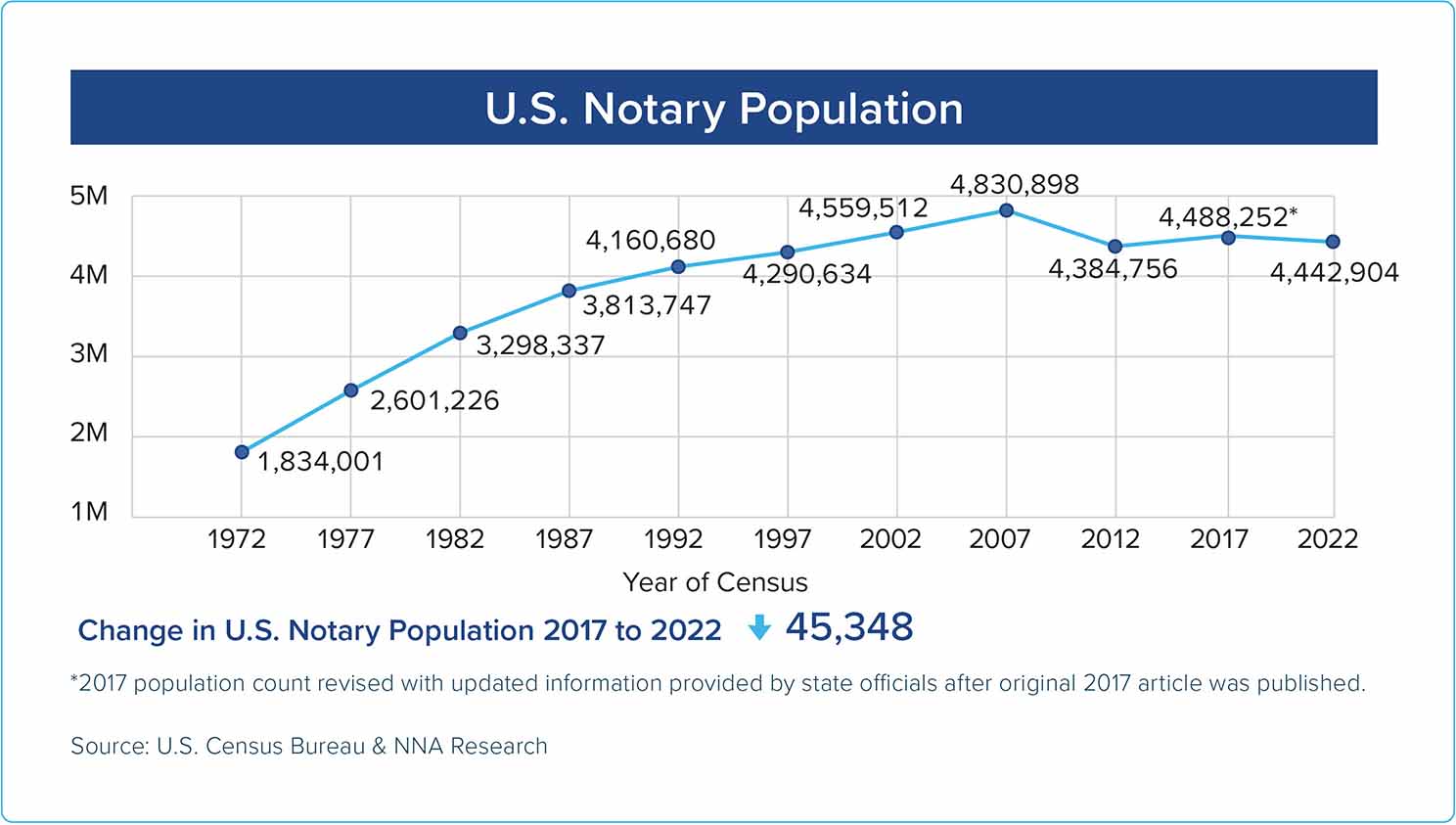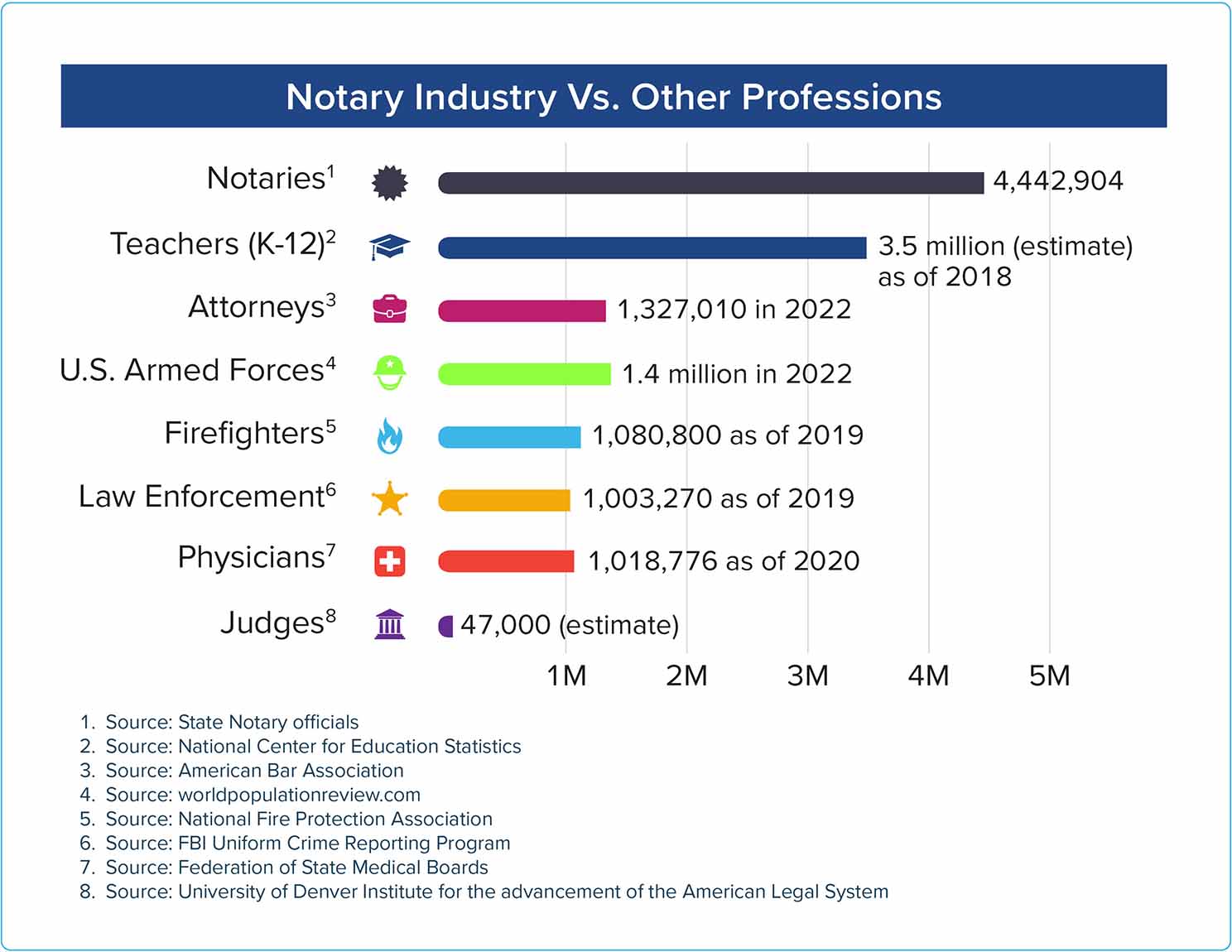In terms of numbers, the U.S. Notary population hasn’t changed much in the past 5 years. But while the numbers remain stable, the demographics of America’s Notary population are showing unprecedented evolution.
The total number of Notaries today remains stable at 4.4 million, close to our count 5 years ago. But due to the COVID pandemic’s impact on the U.S. job market and the growing visibility of social media influencers in the industry, a new generation of Notaries is coming into the fold — younger, often college-educated, and drawn to the potential income of working in the “gig economy” as full- or part-time mobile Notaries and Notary Signing Agents.
 The total number of Notaries today remains stable at 4.4 million. (Source: U.S. Census Bureau & NNA Research)
The total number of Notaries today remains stable at 4.4 million. (Source: U.S. Census Bureau & NNA Research)
How the pandemic shook up the Notary status quo
Every 5 years, the NNA collects data from state officials and survey participants for a census of the state and nationwide population of U.S. Notaries. As of 2017, the demographic makeup of America’s Notaries had remained consistent for decades. Most said they obtained commissions to perform notarizations on behalf of their employers. Because so many Notaries pulled double duty as employees, the first place many customers went to get documents notarized was a bank or other business where notarization services were open to the public.
 How Notaries compare to other professions in the U.S.
How Notaries compare to other professions in the U.S.
As The National Notary Bulletin has reported, the COVID-19 pandemic dramatically changed how to find Notary services. As the pandemic forced cities to lockdown through 2019 and 2021, employee Notaries were no longer readily available to the public. Banks and companies shut their doors and sent their employees home either to wait out the crisis or telecommute. Businesses no longer had Notaries available to walk-in customers.
But the public’s need for Notaries didn’t slow down—in fact, demand for Notaries in 2020 reached an all-time high. With so many brick and mortar businesses out of action, the public turned to independent mobile Notaries for help — and as a result, mobile Notaries saw demand for their services skyrocket.
“Refis, wills, power of attorney documents were more plentiful because of COVID. Normally they wouldn’t ask me for those types of notarizations,” said Virginia mobile Notary John Wonsik. “A lot of signers had documents relating to their elderly parents, or a spouse who is working in a high-risk environment.” At the height of the pandemic, Wonsik was so busy he was turning away 20 notarizations a day.
While it will likely take years to develop full picture of the pandemic’s impact from available data, there are clear signs that COVID-19 shifted many Notaries to mobile services and Signing Agent work. According to data from the NNA’s “Find a Notary Public” page, searches for mobile Notaries shot up 1,750 percent in 2020, with 187,500 people visiting the page in a single year.
The pandemic-driven demand thrust Notaries full throttle into the gig economy, with more and more Notaries working for themselves instead of employers. More people are considering notarization as a full-time or part-time career. Florida mobile Notary Jonathan D. Rexford said, “Being a Notary gave me a life purpose at a real low moment in my life.”
“I retired from being an HR Personnel Officer and needed to continue keeping my mind sharp and focused,” said Jerry Knoester of California. “Being a mobile Notary Public and Signing Agent allows me to continue that ‘iron sharpens iron’ skill.”
Younger people are being drawn to Notary work in 2022
As the pandemic affected Notaries, so does the nation’s aging population. In past years, many Notaries identified themselves as age 50 or older. As the “Boomer” generation ages, they’re retiring from the workforce as reflected by our numbers. In 2017, 42 percent of Notaries surveyed described themselves as age 56 and older. This year, it’s down to 32.8 percent. And more young people are joining the Notary ranks, with 27.4 percent of those surveyed listing themselves as 35 years of age or younger, up from 12 percent five years ago.
 More young people are joining the Notary ranks. (Source: NNA Research Center)
More young people are joining the Notary ranks. (Source: NNA Research Center)
 63% of Notaries identify as female. (Source: NNA Research Center)
63% of Notaries identify as female. (Source: NNA Research Center)
Apart from Notary work helping younger people jump-start their work careers, Notary influencers on social media are drawing more attention from younger viewers looking for income options. Today, many people use platforms such as YouTube or Facebook to find information when looking for new ways to earn money or change careers. Some younger Notaries have their own YouTube channels where they talk about being a Notary, answer Notary-related questions and even give money-making tips and business strategies.
One of these influencers is Sharelle Evans, who hosts “LoveLee Notary” on YouTube and has almost 15,000 subscribers. “I went to YouTube University and didn’t find enough Notary information, so I decided to get a channel and share my journey and mentor others along the way,” she said.
Thanks to influencers like Evans, more people are willing to try working as Notaries today. More than one-third of the Notaries surveyed by the NNA in 2022 said they, like Evans, have become Notaries within the past 5 years. And Notaries reported coming from careers as diverse as healthcare, education, entertainment, hospitality and students.
 Over a third of those surveyed had become Notaries within the past 5 years. (Source: NNA Research Center)
Over a third of those surveyed had become Notaries within the past 5 years. (Source: NNA Research Center)
Texas concierge Notary Angela Yvette retired from the military and wanted to start her own business. “Becoming a Notary/Loan Signing Agent allowed me to manage my own schedule. I get to meet and provide a service to an array of different people from different cultures and walks of life,” she said.
 Many of our survey respondents report having a college degree. (Source: NNA Research Center)
Many of our survey respondents report having a college degree. (Source: NNA Research Center)
Looking to the future for U.S. Notaries
Looking ahead, the next 5 years holds new opportunities for Notaries that may lead to changes as dramatic as those between 2017 and 2022. Due to the necessities of avoiding face-to-face contact during the pandemic, more than 40 U.S. states now authorize Notaries to perform remote notarizations where Notaries and signers communicate through live audiovisual communication instead of meeting physically in the same location.
But despite the rapid enactment of laws in many states, remote notarizations remain rare compared to the millions of traditional notarizations performed each year. 27 percent of Notaries we surveyed this year — many who are certified Signing Agents or mobile Notaries — said they are authorized to perform remote notarizations. However, nearly half of those reported they have only performed 5 or fewer.
It remains to be seen how these new technologies and business trends in the coming years will impact the work of Notaries. But with the need for Notaries and their services still high, it is reassuring that a new generation of Notaries is as ready and willing to serve the public as those that preceded them.
Related Articles:
How To Become A Notary Public
Notary Quick-Start Training